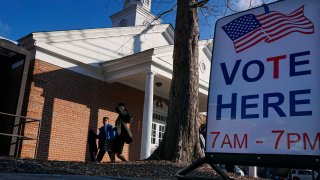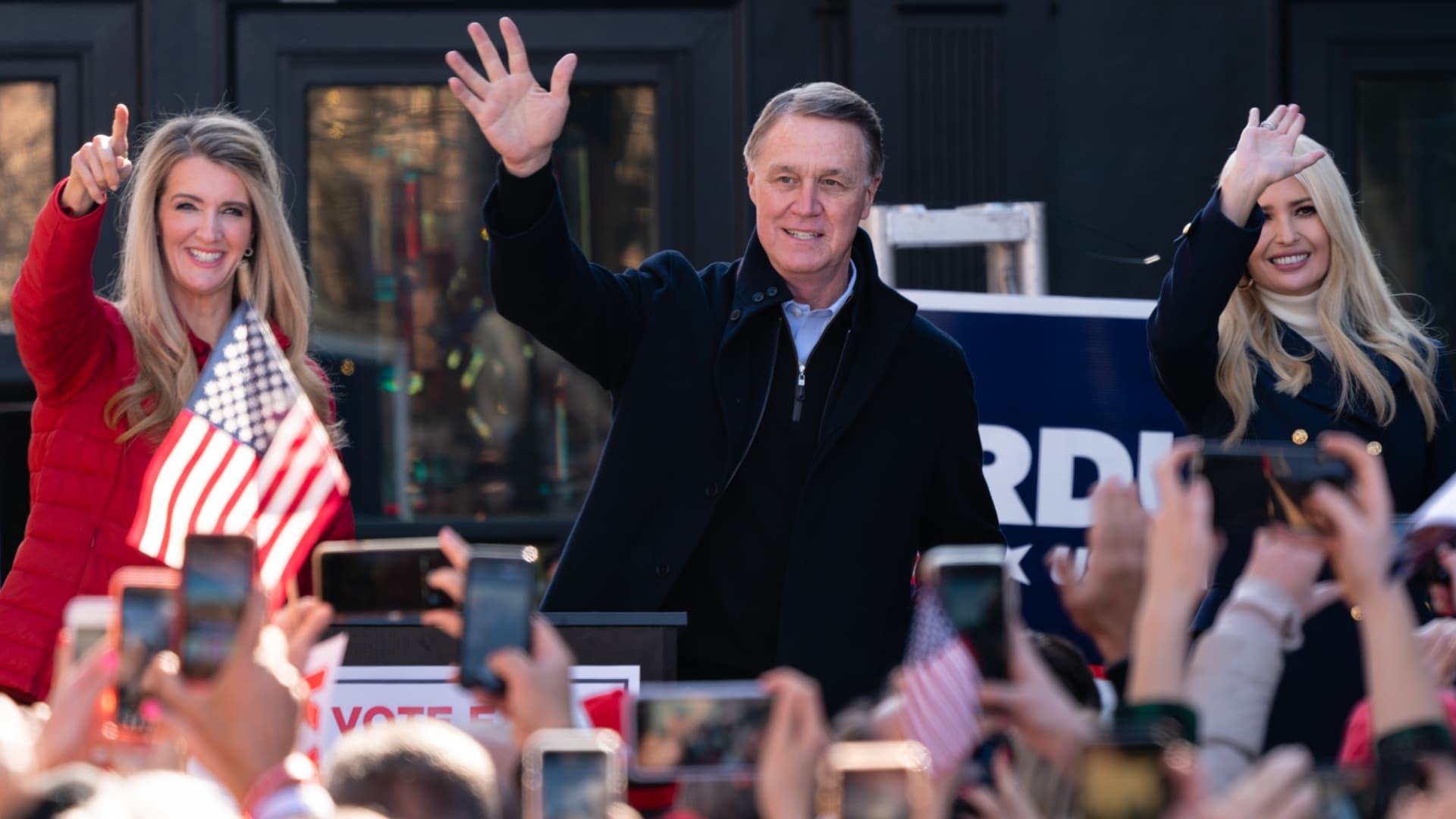
- Amid a Black-White political and religious divide, Asian American Christian communities represent untapped voter networks for political parties.
- In Georgia's crucial Senate runoff races, Democrats have ramped up outreach to Asian American voters overall, hoping to reprise the high voter turnout that helped flip the state blue in November.
- GOP Sens. David Perdue and Kelly Loeffler will face off against Democratic challengers Jon Ossoff and Rev. Raphael Warnock on Jan. 5 in a runoff election that will decide which party controls the Senate.
When Helen Ho founded Asian Americans Advancing Justice-Atlanta in 2010, she made faith outreach a central part of the organization's civic engagement work.
She had grown up attending Korean American churches in South Carolina and Georgia, and she understood the importance of religious communities for Asian Americans and Pacific Islanders.
"When I grew up, literally, the church was the only nonprofit my parents gave money to," said Ho, former executive director of the nonpartisan advocacy group in Georgia.
In American politics, the most prominent blocs of religious voters have historically been Christians: White evangelical voters, who have largely been a Republican stronghold, and Black Protestant voters, who primarily align with Democrats.
Religious Asian Americans and Pacific Islanders, or AAPIs, in Georgia and across the country are not a monolith. Their faiths include Christianity, Islam, Buddhism, Hinduism and other traditions. Yet amid a Black-White political and religious divide, Asian American Christian communities represent untapped voter networks for political parties.
In Georgia's Senate runoff races, Democrats have ramped up outreach to AAPI voters overall, hoping to reprise the high voter turnout that helped flip the state blue in November. Incumbent GOP Sens. David Perdue and Kelly Loeffler will face off against Democratic challengers Jon Ossoff and Rev. Raphael Warnock on Jan. 5 in a runoff election that will decide which party controls the Senate.
Money Report
Faith has been at the forefront of the runoff races. Warnock is senior pastor of Ebenezer Baptist Church, where Martin Luther King Jr. preached. Ossoff discusses his Jewish upbringing on the campaign trail. Perdue is Methodist and Loeffler is Catholic; the two have appealed to conservative Christian voters.
But candidates on both sides of the aisle have largely overlooked the role of religion for Asian American voters who could help decide an election expected to come down to razor-thin margins.
Faith among Asian Americans
Asian American voters overall made up only roughly 3% of Georgia's eligible voters in 2019, but a historic surge in AAPI voters helped propel President-elect Joe Biden to victory in the state, according to Democratic data firm TargetSmart.
A 2012 Pew Research Center study found that a plurality of Asian Americans in the U.S., about 42%, identify as Christian. Among Korean Americans, the proportion of Christians rises to 71%, and among Filipino Americans, 89%.
Churches provide community centers and support networks for Asian Americans. Faith institutions are embedded in the growing AAPI communities in Georgia and especially the metro Atlanta area, said Helen Jin Kim, a professor of religious history at Emory University's Candler School of Theology who also organizes with local faith leaders and Asian American advocacy groups.
"These ecclesial communal spaces are really important when it comes to voting behavior, but they're often overlooked," Kim said. "AAPIs are a part of a diverse body of religious communities and it's important to also be able to connect with those spaces."
James Woo, communications manager and Korean outreach leader for Advancing Justice-Atlanta, said that AAPI churches are "the go-to community space for us to share messages with a larger congregation" about nonpartisan voter registration and get-out-the-vote efforts.
"Especially for first-generation Asian immigrants and refugees that may not be plugged into 'mainstream' or English language press, the information they get about their society is either through their faith group or through their home language press," Ho said.
Political organizing
During the 2018 midterm elections, Ho helped organize an early voting campaign among Atlanta-area Korean American churches inspired by the "souls to the polls" tradition of Black churches in the South.
But there has been less outreach to AAPI communities from political groups through a religious appeal.

Unlike other groups of Christian voters, Asian American Christians have not consolidated under either political party, said Janelle Wong, a political scientist at the University of Maryland and author of "Immigrants, Evangelicals, and Politics in an Era of Demographic Change."
This contrasts with the political affiliations of White evangelical voters and Black Protestant voters. Leading up to the 2020 presidential election, 78% of White evangelical registered voters supported GOP President Donald Trump, while 90% of Black Protestant registered voters backed Democratic President-elect Joe Biden, the Pew Research Center found.
Wong's research found that AAPI Christian voters are more conservative than Asian Americans who do not identify as evangelical, but are more liberal than their White evangelical counterparts. Asian American evangelicals often align with the Republican Party on some social issues such as abortion, but align with Democrats on issues such as immigration, health care and race.
Political and social views also vary between different communities, as the Asian American identity includes a wide array of ethnicities, cultures and experiences.
"For Democrats, there's in some ways more issue alignment, but there's not very much mobilization," Wong said. "There hasn't been the same kind of concentrated effort to Asian Americans of any religious background or Asian Americans as a whole amongst the Democrats until pretty recently."
The Georgia Senate runoffs
The Perdue campaign, the Warnock campaign and the Georgia Democratic Party did not respond to CNBC's requests for comment about outreach to Asian American Christian communities. The Loeffler campaign referred CNBC to the Georgia GOP, which provided a press release about its updated Asian Pacific American Advisory Board, but did not provide details about outreach to AAPI Christian communities.
The Ossoff campaign said it has hosted dozens of AAPI faith-based events throughout the year, including targeted outreach to Ismaili communities, visits to mosques, and virtual events and meetings with AAPI faith leaders.
Cam Ashling, Osoff's AAPI constituency director, "has made engaging AAPI voters of faith in Georgia a key component of the campaign's work to mobilize AAPI voters across the state," the campaign said.
Ashling hosted a call with Korean American pastors in Augusta and partnered with a coalition called AAPI Christians for Biden, according to the campaign.
AAPI Christians for Biden said it had planned a news conference slated for Dec. 17 with Atlanta-based Korean American pastors to support the Democratic Senate candidates ahead of the runoffs. According to one of the event organizers, the Ossoff campaign said it could not participate while on a bus tour and expressed interest in doing something in the near future.
The Warnock campaign had been working with the coalition in advance of the planned news conference, the organizer said, but the event fell through the day before. The Warnock campaign said in an email that it had a scheduling conflict.
The Rev. Byeong Han, a pastor at the Korean Central Presbyterian Church of Atlanta, was one of the speakers scheduled for the news conference. There are certain restrictions on partisan political activity for churches in order to maintain their tax-exempt status, but these restrictions don't apply to nonpartisan engagement or religious leaders acting in their personal capacity.
Han said that while some of his fellow pastors in Korean and Asian American ministries may be apprehensive to discuss politics, he feels strongly that civic engagement is important for AAPI Christians.
"Since I came to this church, I encourage my congregation to do their voter registration and go to vote," Han said. "I usually tell my members it's not about politics. This is about citizens' rights and responsibility."
Han hopes more Asian American Christian communities will continue to participate in the political process.
"Asian Americans are very important in this election and beyond," Han said. "So, let's step up, not step back."






